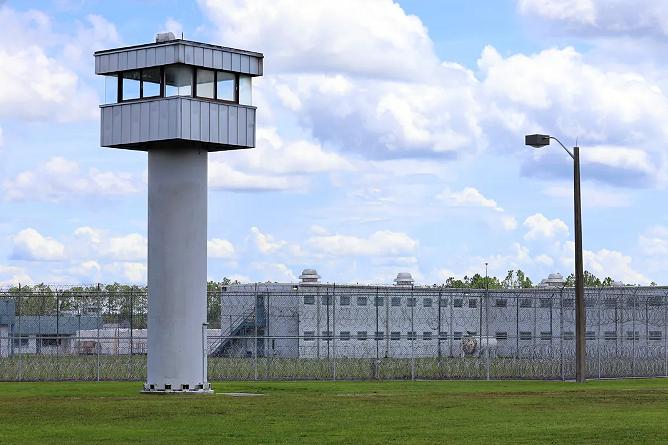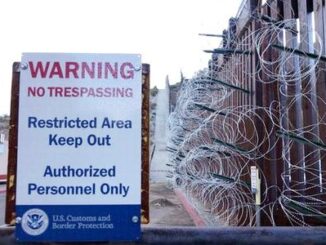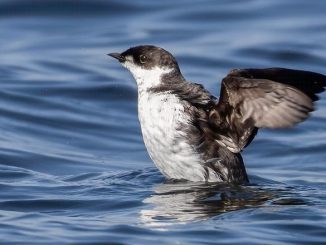
MIAMI, Florida, August 23, 2025 (ENS) – A federal judge has ordered the State of Florida and the Trump administration to halt construction, stop bringing new detainees and begin winding down operations at the mass detention center in the Big Cypress National Preserve known as “Alligator Alcatraz.”
Big Cypress is located just to the south of Everglades National Park. It forms the northern border of the larger Everglades ecosystem and provides a vital water source for the park and coastal estuaries.
The preliminary injunction, requested in a lawsuit brought by the nonprofit Friends of the Everglades, the Center for Biological Diversity, and the Miccosukee Tribe of Indians of Florida, marks a victory for Florida’s imperiled wildlife and fragile ecosystems which are threatened by the detention center.
In June, the three plaintiffs brought their lawsuit in the U.S. District Court for the Southern District of Florida against Homeland Security Secretary Kristi Noem, ICE Acting Director Todd Lyons, as well as Kevin Guthrie, head of the Florida Division of Emergency Management, and Miami-Dade County, owner of the detention center site in the Everglades National Park at issue in this case.
In an 82-page ruling issued August 21, Judge Kathleen Williams cites extensive evidence demonstrating harm to the Everglades caused by operation of the facility, which was built without any of the environmental reviews required by law.
The decision means the facility must wind down operations “in an orderly fashion within 60 days.”
The environmental groups hosted a virtual press conference Friday to discuss the ruling.
“This is a landmark victory for the Everglades and countless Americans who believe this imperiled wilderness should be protected, not exploited. It sends a clear message that environmental laws must be respected by leaders at the highest levels of our government – and there are consequences for ignoring them,” Executive Director of Friends of the Everglades Eve Samples said.

The detention center was built in eight days in June to hold thousands of detainees on the site of a former airfield. The facilities are to be funded by FEMA’s Shelter and Services Program, Noem said in a June statement.
Now that hundreds of migrants are detained there, the American Civil Liberties Union, ACLU, has learned that conditions inside the facility are inhumane.
“The first group of detainees arrived at the facility on July 3rd, and in the short time since, hundreds are now detained in makeshift tents and cages, exposed to extreme heat, mosquitoes, and unsanitary conditions, and surrounded by snakes and alligators,” the ACLU said in a post on its website.
“Congressional visitors reported cages holding 30 or more individuals at temperatures near 100 degrees. Detainees report minimal and sometimes contaminated food, bug infestations, overflowing toilets, and lack of medical care – conditions so severe that they have led the detainees to stage a hunger strike.”
The plaintiffs successfully persuaded the court that the so-called “Alligator Alcatraz” poses serious threats to the sensitive Everglades ecosystem, endangered species, clean water, and internationally recognized dark night skies.
“The site is more than 96 percent wetlands, surrounded by Big Cypress National Preserve, and is habitat for the endangered Florida panther and other iconic species. This scheme is not only cruel, it threatens the Everglades ecosystem that state and federal taxpayers have spent billions to protect,” Samples explained. “Fifty-six years later, the threat has returned, and it poses another existential threat to the Everglades.”
Samples follows in famous footsteps. In 1969, the group she now heads, Friends of the Everglades, was founded by Marjory Stoneman Douglas (1890-1998) to stop harmful development at this same location.

Douglas was an American journalist, author, women’s suffrage advocate, and conservationist known for her defense of the Everglades against efforts to drain it and reclaim land for development. She wrote the book “The Everglades: River of Grass (1947), which redefined the popular idea of the Everglades as a treasured river instead of a worthless swamp.
“This ruling affirms what we argued in court – that the government can’t just build something in the middle of the Everglades and the Big Cypress preserve with no environmental review, and no public input,” said Tania Galloni, managing attorney for the Florida office of Earthjustice, a public interest environmental law firm that works pro bono for its clients.
“This is why we have environmental laws,” Galloni said, “to protect the wetlands and ecosystems we all depend on from illegal development.”
A temporary restraining order pausing new construction at the detention center – including filling, paving, and installation of new infrastructure and lighting – has been in place since August 7.
“The state and federal government paved over 20 acres of open land, built a parking lot for 1,200 cars and 3,000 detainees, placed miles of fencing and high-intensity lighting on site and moved thousands of detainees and contractors onto land in the heart of the Big Cypress National Preserve, all in flagrant violation of environmental law,” said Paul Schwiep, counsel for Friends of the Everglades and Center for Biological Diversity.
The detention center site is surrounded on all sides by the Big Cypress National Preserve, America’s first national preserve, established on October 11, 1974. Big Cypress protects ecologically sensitive wetlands and a dozen endangered and threatened species, including endangered Florida panthers and Florida bonneted bats.
Florida panthers have been documented on the site where the detention center now sits. The preserve is a freshwater swamp ecosystem that provides the largest unbroken acreage of habitat for panthers in south Florida.

The Florida panther is currently listed as endangered. During the 1970s, only about 20-30 Florida panthers remained in the wild. Today, there are close to 200 still in the wild. The National Park Service estimates the panther population at between 130-160 cats within the state of Florida. Big Cypress National Preserve is inhabited by 30-35 of those cats.
Hunting continues in the Big Cypress Preserve today, but endangered panthers are not fair game. Common species of interest are whitetail deer in the fall, turkeys in the spring, and feral hogs.
The 729,000 acre preserve, larger than the state of Rhode Island, is visited by roughly one million people each year.
“Over the course of a four-day hearing we presented many witnesses who testified to the environmental havoc this operation created and the defendants’ callous disregard of the law. The defendants presented just one witness – who could not show that this project was actually needed, much less that it was constructed consistent with the law. We proved our case and are pleased that the court has issued a preliminary injunction against this travesty.”
The August 21 preliminary injunction will remain in place while the lawsuit challenging the detention center is heard. The plaintiffs’ lawsuit seeks a detailed environmental impact study, as required by the National Environmental Policy Act, on the part of the federal government.
“This injunction is a huge relief for millions of people who love the Everglades,” said Elise Bennett, Florida and Caribbean director and attorney at the Center for Biological Diversity. “This brutal detention center was burning a hole in the fabric of life that supports our most iconic wetland and a whole host of endangered species, from majestic Florida panthers to wizened wood storks. The judge’s order came just in time to stop it all from unraveling.”
Florida to Open Another Migrant Detention Center
Regardless of the Alligator Alcatraz ruling, the State of Florida is doubling down on its commitment to deport illegal migrants.

On August 14, Governor Ron DeSantis announced that Florida is expanding its capacity to detain and deport illegal aliens. Florida is now opening a new temporary immigration detention facility at a shuttered state prison for men in north Florida to process, stage, and return illegal aliens to their countries of origin.
“Today, I announced that Baker Correctional Institution in Sanderson will now serve as a Deportation Depot to detain and process illegal immigrants for removal, building on the success the state has had with Alligator Alcatraz,” said Governor Ron DeSantis, before Judge Williams’s ruling. “We’ll enforce the law, we’ll hold the line, and we will keep delivering results.”
Now nicknamed the Deportation Depot, the facility has the capacity to hold more than 1,300 detainees and will be set up with the same services as Alligator Alcatraz. Costs will be reimbursed by federal partners. The Florida National Guard rather than the Department of Corrections will work at the facility.
Baker Correctional is surrounded by the Osceola National Forest, a pine and cypress forest where cougars and black bears still live.
The nearest airport, Lake City Gateway Airport, is about 12 miles west, making the location of Baker Correctional what the governor calls “ideal” for quickly deporting illegal aliens that have been processed at this facility.
Featured image: President Donald Trump visits Alligator Alcatraz, joined by Homeland Security Secretary Kristi Noem, Florida Governor Ron DeSantis and other officials. July 1, 2025, Big Cypress National Preserve, Florida. (Photo courtesy
© 2025, Environment News Service. All rights reserved. Content may be quoted only with proper attribution and a direct link to the original article. Full reproduction is prohibited.



